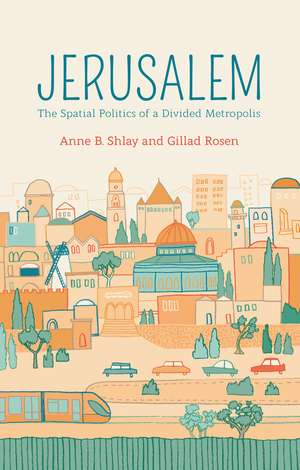Jerusalem – The Spatial Politics of a Divided Metropolis: Cărțile Sidoniei Bogdan
Autor AB Shlayen Limba Engleză Paperback – 28 mai 2015
Jerusalem: The Spatial Politics of a Divided Metropolis is about this constellation of competing on–the–ground interests: the endless set of claims, struggles, and debates over the land, neighborhoods, and communities that make up Jerusalem. Spatial politics explain the motivations and organizing around the battle for Jerusalem and illustrate how space is a weapon in the Jerusalem struggle. These are the windows to the world of the Israel–Palestine conflict.
Based on ninety interviews, years of fieldwork, and numerous Jerusalem experiences, this book depicts the groups living in Jerusalem, their roles in the conflict, and their connections to Jerusalem′s development. Written for students, scholars, and those seeking to demystify the Jerusalem labyrinth, this book shows how religion, ideology, nationalism, and power underlie patterns of urban development, inequality, and conflict.
Din seria Cărțile Sidoniei Bogdan
- 10%
 Preț: 113.03 lei
Preț: 113.03 lei -
 Preț: 119.62 lei
Preț: 119.62 lei - 6%
 Preț: 318.32 lei
Preț: 318.32 lei -
 Preț: 79.44 lei
Preț: 79.44 lei - 14%
 Preț: 72.63 lei
Preț: 72.63 lei -
 Preț: 151.14 lei
Preț: 151.14 lei - 16%
 Preț: 69.50 lei
Preț: 69.50 lei -
 Preț: 49.00 lei
Preț: 49.00 lei - 17%
 Preț: 51.75 lei
Preț: 51.75 lei - 17%
 Preț: 78.92 lei
Preț: 78.92 lei -
 Preț: 142.35 lei
Preț: 142.35 lei - 23%
 Preț: 73.42 lei
Preț: 73.42 lei - 23%
 Preț: 53.97 lei
Preț: 53.97 lei - 15%
 Preț: 104.45 lei
Preț: 104.45 lei - 14%
 Preț: 107.16 lei
Preț: 107.16 lei - 17%
 Preț: 57.78 lei
Preț: 57.78 lei -
 Preț: 95.89 lei
Preț: 95.89 lei - 15%
 Preț: 92.35 lei
Preț: 92.35 lei -
 Preț: 103.41 lei
Preț: 103.41 lei -
 Preț: 266.01 lei
Preț: 266.01 lei -
 Preț: 211.71 lei
Preț: 211.71 lei - 13%
 Preț: 176.89 lei
Preț: 176.89 lei -
 Preț: 332.68 lei
Preț: 332.68 lei - 34%
 Preț: 422.93 lei
Preț: 422.93 lei -
 Preț: 326.92 lei
Preț: 326.92 lei - 15%
 Preț: 60.52 lei
Preț: 60.52 lei -
 Preț: 124.51 lei
Preț: 124.51 lei - 22%
 Preț: 77.86 lei
Preț: 77.86 lei -
 Preț: 164.08 lei
Preț: 164.08 lei -
 Preț: 97.56 lei
Preț: 97.56 lei -
 Preț: 108.43 lei
Preț: 108.43 lei
Preț: 97.78 lei
Preț vechi: 127.62 lei
-23% Nou
18.71€ • 19.58$ • 15.57£
Carte indisponibilă temporar
Specificații
ISBN-10: 0745671047
Pagini: 172
Dimensiuni: 140 x 221 x 18 mm
Greutate: 0.3 kg
Editura: Polity Press
Seria Cărțile Sidoniei Bogdan
Locul publicării:Chichester, United Kingdom
Public țintă
upper–division undergraduate and graduate students of urban planning, urban geography, urban sociology, urban politics, Middle East studies, and Israeli studiesCuprins
Figures and Tables vi
Acknowledgments viii
Map of Central Jerusalem x
1 Introduction: The Politics of Space 1
2 The Jerusalem Story: Theory and Methods 18
3 What Is Jerusalem? 40
4 Who Is Jerusalem? 89
5 The Palestinian Challenge and Resistance in Arab Jerusalem 137
6 Downtown Place Making and Growth in Israeli Jerusalem 164
7 Conclusion 185
Notes 195
References 197
Index 211
Recenzii
John Logan, Brown University
Notă biografică
Anne B. Shlay is Professor and Chair of the Department of Sociology at Georgia State University, and past Chair of the Community and Urban Sociology Section of the American Sociological Association
Gillad Rosen is Lecturer in Geography at the Hebrew University of Jerusalem
Descriere
Jerusalem has for centuries been known as the spiritual center for the three largest monotheistic religions: Judaism, Christianity and Islam. Yet Jerusalem s other–worldly transcendence is far from the daily reality of Jerusalem, a city bombarded by conflict. The battle over who owns and controls Jerusalem is intensely disputed on a global basis. Few cities rival Jerusalem in how its divisions are expressed in the political sphere and in ordinary everyday life.
Jerusalem: The Spatial Politics of a Divided Metropolis is about this constellation of competing on–the–ground interests: the endless set of claims, struggles, and debates over the land, neighborhoods, and communities that make up Jerusalem. Spatial politics explain the motivations and organizing around the battle for Jerusalem and illustrate how space is a weapon in the Jerusalem struggle. These are the windows to the world of the Israel–Palestine conflict.
Based on ninety interviews, years of fieldwork, and numerous Jerusalem experiences, this book depicts the groups living in Jerusalem, their roles in the conflict, and their connections to Jerusalem′s development. Written for students, scholars, and those seeking to demystify the Jerusalem labyrinth, this book shows how religion, ideology, nationalism, and power underlie patterns of urban development, inequality, and conflict.
